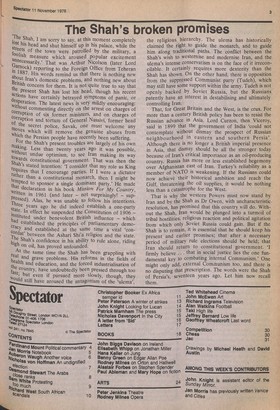The Shah's broken promises
'The Shah, I am sorry to say, at this moment completely lost his head and shut himself up in his palace, while the streets of the town were patrolled by the military, a foolish measure which aroused popular excitement unnecessarily.' That was Arthur Nicolson (later Lord Pal-flock) reporting to the Foreign Office from Teheran M 1887. His words remind us that there is nothing new about Iran's domestic problems, and nothing new about British concern for them. It is not quite true to say that the present Shah has lost his head, though his recent actions have certainly betrayed symptoms of panic, or desperation. The latest news is very mildly encouraging: Without commenting directly on the arrest on charges of corruption of six former ministers, and on charges of corruption and torture of General Nassivi, former head of the secret police, Savak, one must welcome any moves which will remove the genuine abuses from Which the Persian people have recently been suffering. For the Shah's present troubles are largely of his own Making. Less than twenty years ago it was possible, Without undue optimism, to see Iran making its way to_ wards constitutional government That was then the Shah's stated intention: 'I consider that my role as King requires that I encourage parties. If I were a dictator rather than a constitutional monarch, then I might be tempted to sponsor a single dominant party.' He made that declaration in his book Mission For My Country, Written in 1961 (and later — not surprisingly! — SUP Pressed). Alas, he was unable to follow his intentions. Three years ago . he did indeed establish a one-party state. In effect he suspended the Constitution of 1906 — had under benevolent British influence — which had established the principles of parliamentary demo cracy and established at the same time a vital 'concordat between the Ashari Shi'a religion and the state. The Shah's confidence in his ability to rule alone, riding nigh on oil, has proved unfounded. At the same time the Shah has been grappling with real and grave problems. His reforms in the fields of health and education, and the forced industrialisation of the country, have undoubtedly been pressed through too .fast; but even if pursued more slowly, though, they would still have aroused the antagonism of the `ulema', the religious hierarchy. The ulema has historically claimed the right to guide the monarch, and to guide him along traditional paths. The conflict between the Shah's wish to westernise and modernise Iran, and the ulema's intense conservatism is on the face of it irreconcilable. It certainly requires more dexterity than the Shah has shown. On the other hand, there is opposition from the suppressed Communist party (Tudeh), which may still have some support within the army. Tudeh is not openly backed by Soviet Russia, but the Russians patently have an interest in destabilising and ultimately controlling Iran. That, for Great Britain and the West, is the crux. For more than a century British policy has been to resist the Russian advance in Asia. Lord Curzon, then Viceroy, said in 1899 that the government of India 'could not contemplate without dismay the prospect of Russian neighbourhood in eastern and southern Persia'. Although there is no longer a British imperial presence in Asia, that dismay should be all the stronger today because of Iran's critical importance as an oil-producing country. Russia has more or less established hegemony over Afghanistan east of Iran. Turkey's reliability as a member of NATO is weakening. If the Russians could now achieve their historical ambition and reach the Gulf, threatening the oil supplies, it would be nothing less than a catastrophe for the West.
That is why the western Powers must now stand by Iran and by the Shah as Dr Owen, with uncharacteristic. resolution, has promised that this country will do. Without the Shah, Iran would be plunged into a turmoil of tribal hostilities, religious reaction and political agitation from which only Soviet Russia could gain. But if the Shah is to remain, it is essential that he should keep his present and earlier promises; that after a necessary period of military rule elections should be held; that Iran should return to constitutional government. 'I firmly believe ... that in social justice lies the one fundamental key to combating internal Communism.' One might only add, external Communism too, and there is no disputing that prescription. The words were the Shah of Persia's, seventeen years ago. Let him now recall them.


































 Previous page
Previous page